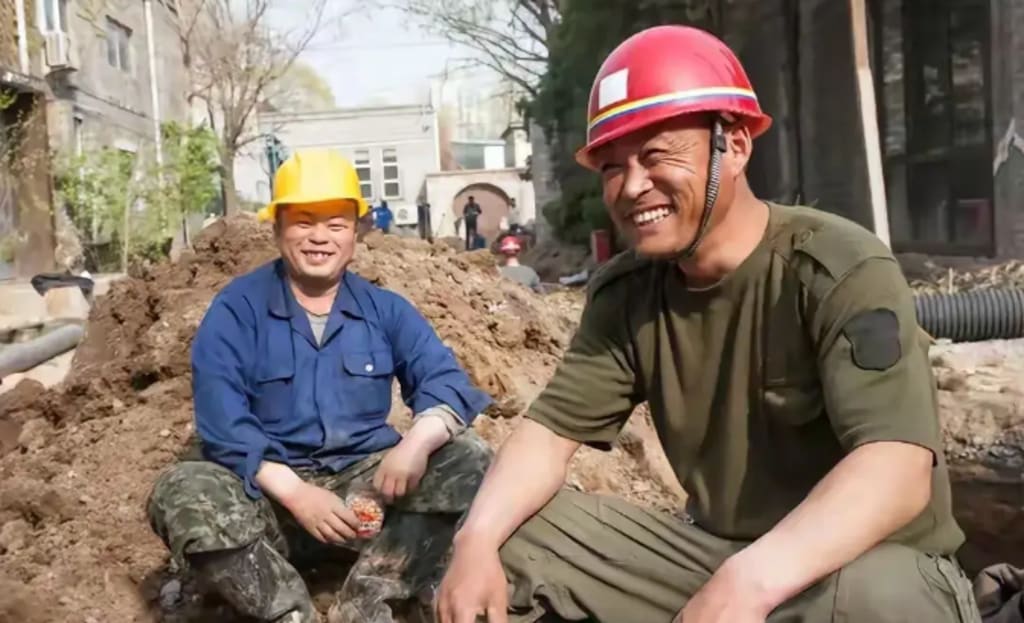In rural areas, a more troubling issue than not being able to find a wife is that many people who work outside are no longer able to return home.
ahong

**I. Rural Transformation: From Pastoral Poetry to Real Challenges**
In our childhood, the village was like a picturesque pastoral poem, with green mountains and clear waters, and the old houses exuded the vicissitudes of time. But now, when I return to my hometown again, what I see is completely different. The roads are crisscrossing like a spider's web, connecting the village with the city, replacing the once quiet dirt roads. This modern transformation is astonishing, but it also brings a series of challenges.
With the construction of roads and the introduction of modern facilities, the lifestyle of rural people has undergone earth-shaking changes. Places that used to take hours to reach on foot can now be reached in just a few minutes by car. This convenient change has made life more convenient for rural people, but it has also brought some problems. Many traditional lifestyles and values have been impacted by the tide of modernization, and some older people feel unadapted to this change, even complaining that the tranquility of the village has been disrupted.
In addition to changes in lifestyle, modernization has also had a profound impact on the economic sources of rural people. People who used to rely on farming and breeding for a living now face the challenges of market competition and economic pressure. With the advancement of urbanization, the prices of many agricultural products have fallen, and the income of farmers has gradually decreased. At the same time, with the flow of the rural population to the city, the reduction of rural labor force has also brought difficulties to agricultural production, and the desolation of farmland and the reduction of livestock have become common phenomena.
Therefore, although rural modernization has brought us many conveniences, it has also brought a series of challenges and problems. We need to recognize the existence of these problems and actively seek solutions to maintain the sustainable development and vitality of the countryside.
**II. The Dilemma of Working Outside and Returning to Hometown: The Collision of Economic Pressure and Social Concepts**
Many migrant workers often fall into a dilemma between working outside and returning to their hometown. On the one hand, working outside can obtain higher income and broader development space; on the other hand, returning to their hometown can enjoy family reunion and local sentiments. This choice is influenced by both economic considerations and social concepts.
For many migrant workers, working outside is to improve living conditions and enhance social status. Working in the city, they can get higher wages than in the countryside, and have more opportunities to learn and grow. However, this choice also means separation from family and unstable life. Long-term work life may lead to estrangement of family relationships, and even affect the growth and education of children.
At the same time, although returning to the hometown can enjoy family reunion and local sentiments, it also faces economic pressure and social concept troubles. Many rural people think that working outside is a helpless move, and returning to the hometown is seen as failure and backwardness. This social concept pressure makes many migrant workers dare not easily return to their hometown, and would rather endure the pressure and loneliness of the city.
Therefore, the dilemma of working outside and returning to the hometown is not only an economic choice but also a collision of social concepts. We need to understand and respect everyone's choice, and find a suitable lifestyle for ourselves. Whether working outside or returning to the hometown, we should maintain a positive attitude, bravely face the challenges of life, and strive to create a better future.
**III. Loans, Mortgages, and Rural Life: Struggling Between Reality and Ideal**
In recent years, more and more rural people choose to buy houses outside and take out loans, which has sparked people's thinking about the conflict between real choices and the ideal of rural life. On the one hand, buying a house with a loan is a realistic choice to solve the housing problem, but on the other hand, it also means greater economic pressure and life challenges.
In many rural areas, with the hot real estate market, buying a house with a loan has become the main choice for many families. Especially some young people, in order to settle down in the city, are willing to borrow to buy a house. However, buying a house with a loan not only requires bearing a huge debt, but also needs to pay a higher mortgage interest every month, bringing heavy economic pressure to the family.
At the same time, buying a house with a loan also impacts the ideal of rural life. Many people dream of returning to the countryside to live a simple, self-sufficient life, but the real economic pressure makes this ideal more and more distant. They have to struggle in the city, work hard for life and the future, and give up the beautiful illusion of rural life.
Therefore, there is a struggle between loans, mortgages, and rural life between reality and ideal. We need to recognize the pros and cons of buying a house with a loan, treat the choices of life rationally, and at the same time, keep pursuing the ideal of rural life. No matter whether to fight in the city or return to the countryside, we should actively face life and strive to create our own happiness and a better future.
**IV. Rural Entrepreneurship: Risks and Opportunities**
Rural entrepreneurship has unlimited possibilities, but also comes with great risks. For many rural people, entrepreneurship is an opportunity to realize their dreams, but it also faces the challenges of fierce market competition and scarce resources.
On the road of rural entrepreneurship, the first thing to face is the limitation of resources. Compared with cities, rural areas have relatively scarce resources, including human resources, financial support, and market information. Therefore, many rural entrepreneurs must rely on their own courage and wisdom, make full use of limited resources, and find entrepreneurial opportunities suitable for their own development.
In addition to resource limitations, rural entrepreneurs also face the pressure of market competition. With the development of the rural economy, more and more enterprises have entered the rural market, and the competition is extremely fierce. In such an environment, to stand firm in the market and succeed, it is necessary to have unique ideas and high-quality products, as well as good market marketing capabilities.
However, rural entrepreneurship is also full of opportunities. With the government's support for the rural economy and the introduction of supporting policies, rural entrepreneurs have more development opportunities. For example, some government projects and poverty alleviation plans provide financial support and policy inclination for rural entrepreneurship, providing entrepreneurs with more opportunities and platforms.
Therefore, rural entrepreneurship has both risks and opportunities. The key lies in whether entrepreneurs can grasp the opportunities correctly, face challenges bravely, and continuously improve their own abilities and competitiveness. Only by continuous efforts can success be achieved on the road of rural entrepreneurship and realize their entrepreneurial dreams.
About the Creator
ahong
I'm Ahong, a writer painting China's stories for the world. Dive into tales that blend tradition with the contemporary, right from the heart of China.
Enjoyed the story? Support the Creator.
Subscribe for free to receive all their stories in your feed. You could also pledge your support or give them a one-off tip, letting them know you appreciate their work.






Comments
There are no comments for this story
Be the first to respond and start the conversation.